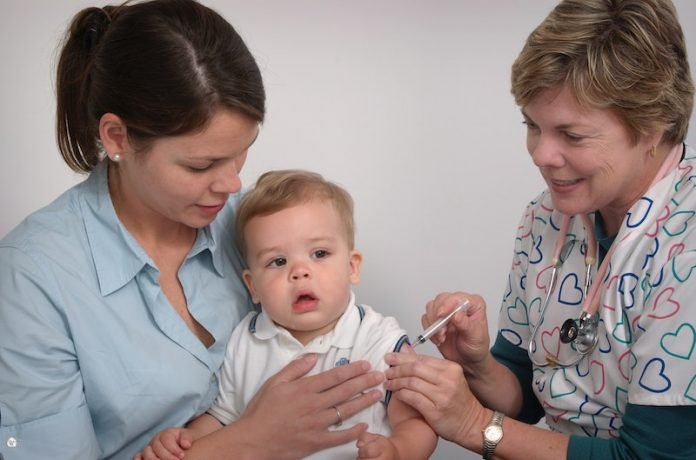
For the last — and littlest — segment of the population yet to receive it, the COVID-19 vaccine is federally approved and available for all people 6 months of age and older.
After hospitalizations among younger children soared with the omicron variant last winter, the news offers parents some relief, but understandably, they also have questions.
Here are answers from a professional who’s also a parent — Dr. Jessica Ericson, pediatric infectious disease physician at Penn State Health Children’s Hospital.
“The vaccine offers the huge benefit of helping to protect children against serious complications and death from COVID, and it has the future benefit of training a child’s immune system to deal with COVID,” Ericson said.
“That’s how we go from a pandemic to an endemic stage, where COVID potentially becomes much less worrisome.”
It’s also another step toward potential normalcy, said Ericson, where parents might not have to worry as much about play dates, sleepovers or sending children to school or day care.
It’s estimated only 30% of children ages 5 to 11 have been vaccinated since Pfizer shots were approved last fall, and Ericson expects the same utilization rate for the younger group.
That’s why she wants to address some of the most common concerns, she said, to help parents make the best decisions for their children.
Is the COVID-19 vaccine safe for babies and toddlers?
“Yes. Vaccines work very similarly regardless of age, and these vaccines have been given to millions of people over the past 18 months and are quite safe,” Ericson said.
“Parents should know that the recent approval for young children is based on the outcome of clinical trials in specific age groups from 6 months to 23 months of age, ages 2 to 5 and ages 6 to 11.”
Not many children die from COVID-19, and many children have only mild symptoms. Why vaccinate?
“I think we get distracted by focusing on death rates. There are a lot of ways a child’s body and life can be disrupted if they get COVID,” Ericson said.
“Younger children are at higher risk of complications because their breathing tubes are smaller and can more easily become clogged with phlegm. Younger children’s immune systems aren’t as robust either.”
There’s also no way to know for sure whether or not your child will be the one to get very sick, she added.
Children who get COVID-19 risk getting long COVID, which carries its own set of physical symptoms, as well as long-term mental health issues such as anxiety and depression.
Will my child suffer from side effects of the vaccine?
The side effects are similar to any vaccine — fever, sore arm, swollen lymph nodes that last a day or so. Younger children tend to have fewer side effects than older children, Ericson said.
Which vaccine is best for my child? Pfizer or Moderna?
It’s personal preference, Ericson said. Pfizer’s vaccine for children under age 5 is one-tenth of the adult dose, and three shots are needed. The first two are given three weeks apart, and the last is given at least two months later.
The Moderna vaccine consists of two shots, each a quarter of its adult dose, given about four weeks apart for kids under 6.
(A third Food and Drug Administration-approved dose may be given at least a month after the second shot for children with compromising immune conditions.)
“Some parents may prioritize gaining immunity quicker and choose Moderna, which provides protection after six weeks, versus about 12 weeks for Pfizer,” Ericson said.
“Other parents will choose Pfizer because side effects are fewer or they feel more comfortable since Pfizer vaccines are already being used in children as young as 5.”
I’ve heard the vaccine is only about 50% effective, so why bother?
“The vaccine does a really good job of preventing serious illness and it makes your child contagious for a shorter period of time,” Ericson said.
“We’d all love a vaccine that is 100% effective, but a vaccine that prevents 50% of infections and nearly 100% of severe illnesses and deaths is a vaccine worth getting.”
When the COVID-19 pandemic began, it was thought that children weren’t major spreaders, but that’s long since been proven untrue, said Ericson.
“Children definitely bring COVID home to the family and spread it when they go out,” she said. “The best way to disrupt that chain is vaccination. If we can stop even 50% of transmissions, our case numbers will plummet.”
If you care about COVID, please read studies about new oral drug that may prevent death from COVID-19, and these people need additional COVID-19 vaccine doses.
For more information about COVID, please see recent studies that older people have more COVID-19 antibodies, and results showing this drug could prevent severe COVID-19.



